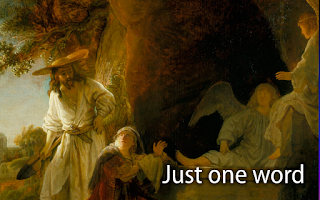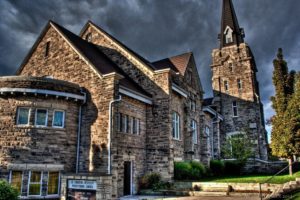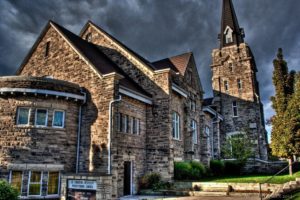 |
Our scripture readings for Sunday are:
If you have any questions or comments about the scripture readings or message please feel free to contact Rev. Scott McAndless, [email protected] |
Just One Word
Hespeler, 21 April 2019 © Scott McAndless – Easter
Isaiah 65:17-25, Psalm 118:1-2, 14-24, 1 Corinthians 15:19-26, John 20:1-18
| S |
ometimes it can happen to any of us – we get caught in a story that we are telling to ourselves. It is a story that may not be true but, because we keep telling it to ourselves, it takes us in a spiral of deeper and deeper despair. That was what Mary was doing and it took one word – just one word – to change everything for her.
Mary had gone out to the tomb, the place where they had laid him, as soon as she could early in the morning. The sun was barely coming over the horizon when she arrived there. And her heart was only fixed on one thing. Her Lord, the only one who had ever given her reason to hope, was dead. She had come to weep and to mourn. She just wanted to throw her arms one last time around the body of the man who had meant everything to her, just to say goodbye, to say that she wished she could have done something to save him. It wouldn’t have really made anything better, of course, but at least she could have gotten some closure.
But it seemed, as she drew near, that even the solace of grief was to be denied her. The stone was rolled away, the tomb apparently empty. There was no body to grieve over. The one word that would help her on this day was not the word grief.
She fled, distraught, looking for someone, anyone to help her makes sense of what was going on. She fled to the men, the disciples who were cowering in fear someplace with her disturbing news, “They have taken the Lord out of the tomb, and we do not know where they have laid him.”
Immediately Simon Peter jumped up and mansplained the situation to her, “Don’t you worry your pretty little head, Mary. I’ll sort this out and make everything alright.” And he ran out to the tomb and another one of the men followed quickly after. Mary followed them slowly, not running as swiftly as they for she felt no great rush to return to the site of her terrible loss. But she could see the men as they turned what should have been an inquiry into a competition.
They were having a race. One sprinted ahead and then the other overtook him. Each one was clearly trying to get to the tomb first. She could just imagine how they would report it to the others later. “I was the first one to get to the tomb,” one would say, completely ignoring the fact that Mary had been the first, of course. “And then the other would protest and say, “well, maybe you got there first but I was the first one who was brave enough to go inside.” And then the other would answer, “Well, I’ll grant that you were the first one to barge in and mess everything up, but I was the first one to believe and doesn’t that count for more?” And then they would spend the next few decades arguing with each other over who was more faithful to his memory and who was most qualified to lead.
By the time that Mary arrived at the tomb again, the two men were heading away, still arguing together. She had to admit that they had really been no help. It was quite clear that the one word that would change everything for her on this day was not the word authority or leadership. Theirs had been no help. She was left feeling totally abandoned. She dissolved into tears, weeping and wailing aloud as she had never done in her life. This day was just getting worse and worse.
As Mary wept, she leaned over and looked into the still-empty tomb, it was no longer exactly as empty as she remembered. Two men were there, sitting where the body had been laid. But were they men? Their clothing was so bright; Mary wasn’t sure she could trust her eyes, especially when they were so filled with tears. It probably didn’t matter what they were though, because they didn’t give her any useful information anyways, just asked her why she was crying. And Mary was still stuck in the story she had been telling herself all morning – the story of what she had come looking for: “They have taken away my Lord, and I do not know where they have laid him.” So clearly, the word visionor the word angel was not to be the word that would change anything.
But here is the truly amazing thing: what happened next didn’t help her either. And what happened next was actual visual proof.
What would it take for you to believe – to say that it was absolutely true beyond a reasonable doubt that Jesus rose from the dead? Most people would say, I suspect, that it would take the risen Jesus standing right there in front of you. Well, Mary got that. She turned around and Jesus was standing right there.
But, with Jesus standing right there, Mary was still stuck on the same story she had been telling herself all morning – that the body had been stolen and she was simply being denied her grief. “Sir, if you have carried him away, tell me where you have laid him, and I will take him away,” she said to the supposed gardener.
Now people have puzzled over this one for centuries. How was it possible that Mary could have failed to recognize this man that she had followed all over Galilee for months if not years? Had Jesus’ appearance has somehow been changed as a result of the resurrection? Was Mary blinded by her tears? There might be some truth to both of those ideas, but the bottom line, I think, is something else.
I think we’re being taught something important about the resurrection. It it’s not something that anyone is going to prove to you simply with evidence. If somebody comes back from the dead, you will find a reason not to believe it.
You might think, and I myself might have once thought, that it was my job to get up here and convince you with logic and reason and evidence that about 2,000 years ago a Jewish man from Nazareth rose from the dead and that that changes everything, but I have come to believe that testimony and evidence will never do that for you. The word that changes everything is not proof.
What was the one thing, then, that changed everything for Mary? It was just one word. And that word, you’ve guessed it by now, was Mary. It wasn’t that the risen Jesus had spoken to her. He had already spoken to her at that point, had asked her why she was weeping. That expression of human concern was important, but it wasn’t what changed everything. The change came when Jesus connected to her and her alone. It was personal and private. It was her name.
My friends, this is the one thing that I want you to understand on this Easter day. The resurrection of Jesus is not merely an historical event. I mean, yes, it happened at a particular moment in history. If you had been there you would have experienced something extraordinary.
But to grasp that part of it is only to grasp the smallest part. The resurrection of Jesus is something that becomes true when it happens to you. When the risen Jesus looks you in the eye and calls you by name – calls out Mary or Peter, Paul or Helen. You are who he rose for. You are the one he suffered it all for. He wants you to know it, not merely with your brain but rather with everything that you are. That changes everything.
Sunday, April 21, 2019
Why I Made a Controversial Notice of Motion
About a month ago, I made a notice of motion at a meeting of my Presbytery – Waterloo-Wellington. A notice of motion is basically a heads-up – an indication that you intend to put forward a motion for debate that will bring significant change or that might be controversial.
This was the notice that I gave:
At a future sederent, I will move or cause to be moved:
That the Presbytery of Waterloo-Wellington insert in an appropriate place in its standing orders the following section:
Recognizing Affirming Congregations:
Recognizing that there is a variety of opinion and theological understandings of the place of people who identify as LGBTQ+ in the life of the congregations of our presbytery, the Presbytery of Waterloo-Wellington would like to affirm that an inclusive and affirming approach is valid and has been chosen by a number of our congregations. We reflect this affirmation in the following standing orders of our presbytery.
- The Presbytery will perpetually extend the philosophy of amnesty adopted by the General Assembly to enable to work of the Rainbow Communion to all of the work of the Presbytery; the Presbytery will engage in no discipline regarding the revelation that any member of Presbytery or member or adherent in any congregation within its bounds identifies as LGBTQ+.
- The Presbytery will engage in no discipline of a teaching elder who, with the support of his/her session, presides over or participates in any marriage that is considered legal in Canada. The presbytery will not compel any minister or session to perform a particular marriage. The presbytery will recognize the status of any legal marriage in Canada.
- Presbytery will continue to exercise oversight and discernment over every student and candidate for ordination. The sexual orientation or gender identity of any potential candidate will not be entertained as a cause to call their call to ministry into question.
- In processing calls, the Presbytery will continue to exercise all due diligence as directed by the Book of Forms. The Presbytery does not consider that the sexual orientation or gender identity of a potential candidate can, in itself, cause a call to be invalid.
- Interim moderators must not prevent congregations from considering a candidate solely on the grounds of gender identity or sexual orientation.
- The Presbytery will not use its authority to compel any congregation to take specific actions to be more affirming. It will continue to engage in dialog and discussion on the matter.
I would like to take the opportunity in this blog post to offer some explanations for why I decided that it was necessary to make such motion a meeting of the Presbytery (called a sederent) in the near future.
The state of the discussion
Many people will know that the Presbyterian Church in Canada has been talking about the place of people who identify as LGBTQ+ in the life of the denomination for quite some time – for a couple of decades really. There have been some changes and certainly many shifts in attitude in that time, but the denomination as a whole has not really resolved anything. Another report, prepared by former moderators of the General Assembly will be presented to the General Assembly this June. I certainly hope and pray that it will enable some constructive discussion, but I have little expectation that it will resolve the question in any conclusive way.
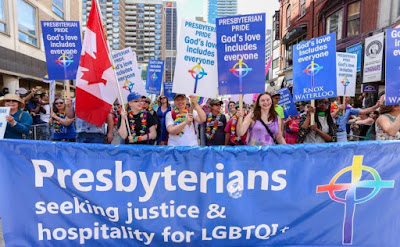 |
| Presbyterian congregations joyfully participate in a Gay Pride event |
But meanwhile, a number of congregations have come to some resolution. Leaders in those congregations, both clergy and lay, have taken a serious theological, biblical and ecclesiological look at the question and come to the conclusion that not only is it possible for them to welcome all members of the LGBTQ+ community into the lives of their congregation but that this is a faithful way for them to live out the Christian gospel.
Thus, these openly welcoming and affirming congregations exist. They are doing their best to live out the gospel and there is much evidence that God is at work in their midst. That is not to say that all such congregations are thriving and growing numerically. They face the same challenges that all of our congregations face in terms of demographic and societal change. Some are growing, some are holding steady, some are shrinking. Affirming congregations don’t seem to differ significantly from the overall trends. I’m not suggesting that what they have done is a panacea for all congregations. Nevertheless, the evidence is there that the Holy Spirit is at work in those congregation. The Spirit is present in changed and changing lives, in meaningful mission and purpose. That is the evidence that matters.
The Presbytery is Responsible for its Congregations
In our polity, the presbytery is responsible to care for and give oversight to all congregations in its territory. This has always meant supporting congregations that have various ways of living out the gospel and that have differed in many ways. The Presbytery is required, therefore, to give thought to how it supports its affirming congregations.
There is a reason why our system of church government is called Presbyterian. It is because the Presbytery is the key body in the whole system. The Presbytery plays a key role particularly in the care of congregations. It is the body that is responsible for the care, conduct and discipline of clergy. It is also the body that ordains ministers and has the authority to judge whether a call to ministry is a true Gospel call.
In my motion, I have focused only on those areas of responsibility that rightly belong to the Presbytery. The Presbytery does not declare doctrines or set educational standards for clergy, but it is responsible for discipline and ordination.
I have written this motion because I believe that the Presbytery of Waterloo-Wellington has no desire to discipline its members because of such things as sexual orientation or gender identity. I also do not believe that we would discipline a minister who carefully considered all of the theological and practical questions and was willing to participate in some way in a same-sex marriage. Indeed, some of these things have happened and we have not engaged in any discipline. Some of these things have happened in other Presbyteries as well with no resultant discipline. I simply desire to make the reluctance of the Presbytery to discipline in such cases a matter of our policy.
I also believe that my presbytery, if presented with a call to ministry that was well supported by a congregation and that was otherwise in good order, would not reject such a call merely on the basis of a candidate’s sexual orientation or gender identity. So why not declare that as policy as well?
Of course, I might be wrong. That may not be where the Presbytery is at this moment in time. That is why I put this forward as a motion to be debated and decided on by the full body of Presbytery.’
Is this the time?
Some have suggested that this is not the time to put forward such a motion. There is a committee working on such matters that will be reporting to the upcoming meeting of General Assembly. Should we not wait for the moderators to do their work and for the Assembly to make its decisions? I certainly support the work of the moderators and the General Assembly. I will be a part of that Assembly as a commissioner and plan to fully participate. The General Assembly must decide how it may best take care of its responsibilities and duties. But that does not remove the need for the Presbytery to deal as positively and constructively as it can with the congregations it is responsible for – all of the congregations. I feel that for the Presbytery to declare how it wants to deal with its affirming congregations now can only contribute to the ongoing conversation in a helpful way.
Of course, that too is up to the Presbytery. I intend to present my motion to the Presbytery in May. It may, in its wisdom, choose to take a vote, or defer or table the motion until after Assembly meets. I will respect the wisdom of the Presbytery in that. If a vote is taken, there may well be an appeal and I would appreciate the clarification of these important matters of the rights and responsibilities of the Presbyteries that such an appeal would surely bring.
Palming off the palms
Hespeler, 14 April 2019 © Scott McAndless – Palm Sunday
Psalm 118:1-2, 19-29; Luke 19:28-40, Isaiah 50:4-9a, Philippians 2:5-11
| T |
oday is Palm Sunday – the day when the church celebrates the triumphal entry of Jesus into the city of Jerusalem. Every Christian knows that. Every year we read the story of that day. If you follow the lectionary (as we are doing this year) one year you read the account in the Gospel of Matthew, the next year in Mark and the next year in Luke. So I was very eager this year to turn to Luke’s account of the story of that day. What new insight would I find into the palms and that meaningful entry? So I read the passage… and I honestly could not believe what I saw.
I read it through once and I just thought that I missed them, so I read it again. Nope, still weren’t there. What is missing in Luke’s story? There are no palms and no triumphal entry in the Gospel of Luke. I went and looked it up on Wikipedia and Wikipedia assured me that, yes, that they were there, but I couldn’t find them. I thought it might be a translation error. I actually went and got out my Greek text of the New Testament and looked in there. But there are no palms in the original Greek text and not in any English translation that I could find. The Gospel of Luke’s story of the triumphal entry on Palm Sunday contains neither palms nor entry.
Are you shocked? I was. I’ll bet you didn’t even notice when we read it. I’ve been reading and preaching on this passage for years and I never noticed it before. Luke states that the disciples lay their garments on the ground as Jesus went past, but there is not a single word about waving greenery either in people’s hands or on the ground. What’s more, while Luke does describe Jesus’ approach to the city from the Mount of Olives, his account of the event ends while Jesus is still outside the walls.
So what am I saying here? That we should gather up all of the palms that the kids were waving around this morning and throw them away? Am I suggesting that we did something wrong this morning by re-enacting it as we did? No, not at all. The mere fact that Luke doesn’t mention palm leaves doesn’t mean that there weren’t any there. And just because Luke cuts off the account before Jesus arrives in the city doesn’t mean that he didn’t make a triumphal entry. Of course he did. In fact, there is evidence that Luke knew that palms were part of the story, they were in his source material. But that leaves us with another question, doesn’t it? If Luke knew that people had them there, why didn’t he mention them?
Well, consider this: what if Luke knew what he was doing? Have you ever wondered about why the palms were there in the first place? Why is it that a crowd of people who were excited about the arrival of Jesus in Jerusalem just spontaneously all went and broke down branches and started waving them around and throwing them on the road? I have seen a lot of people in crowds or spontaneous demonstrations. I have seen people do a lot of things in those situations and use a lot of props, but I have never seen anybody cutting down branches to use as a part of a demonstration. So, if the people were doing that particular thing on that particular occasion, they must have had a reason. The palms must have meant something to them. And indeed they did!
I’m going to have to give you just a little bit of history here to explain. As you know, in Jesus’ time Judea and Galilee were under Roman control. But before the Romans had come along and conquered the region, Judea had actually been an independent kingdom that was ruled over by a Jewish dynasty known as the Hasmoneans. When the Romans took over they ended the Hasmonean dynasty and put their own puppet king in charge of the region, a guy that you might have heard of named King Herod the Great. Later some parts of the region, such as Galilee, passed on to King Herod’s sons while Rome took on direct rule of other parts, such as Judea.
Okay, what does that have to do with people waving around palm branches on Palm Sunday? Everything. What if I were to tell you that palm branches where a symbol of the Hasmonean dynasty? That’s right, thousands of ancient Hasmonean coins have been found marked with the symbol of crossed palm branches. Now, do you think that it was just a coincidence that the people cut down palm branches on that day?
And think about what all of this would have looked like, especially to the Romans. It is only days before the great feast of Passover, the day when the people of Israel celebrate the time when their God freed them from being slaves to a great empire and a large procession of people approach the city of Jerusalem from the Mount of Olives where everyone could see them waving the symbols of the very kings that the Romans displaced when they took over and hailing somebody in their midst, somebody riding on the back of a donkey, as a king.
I’ll tell you what it looked like. It looked like sedition. It looked like open revolt. Is it any wonder that, within a matter of days, the guy who had been riding on that donkey had been arrested and nailed to a cross?
The people waving palm branches was roughly the equivalent of people today wearing orange to an NDP or blue to a Conservative or red to a Liberal rally, except, of course, that those parties are all legal in Canada. The Hasmonean party, if you can call it that, was not legal.
So, having learned all of that, the mystery of Luke’s story of a palm-free Palm Sunday is an even bigger mystery to me. Why did Luke leave out the palms when all of the other gospel writers mention them? I’m convinced it must have been a deliberate decision. Is it possible that Luke was concerned about the idea that Jesus and the people with him might have indeed been making a political statement that day?
I think I know exactly how Luke felt. I too am feeling pretty cautious about political statements these days. Can I be candid here? I’m a bit worried about what the political environment in this country might look like over the coming months. We are heading towards a federal election as you know, and I fear that it will be one of the most divisive we have seen in recent times. The problem, in my mind, is not the parties or their policies (though I won’t say I don’t personally have some concerns about both); the problem is the context that we find ourselves in. We are living in a time when fewer and fewer Canadians get their news and information from reliable sources – a world where a totally made up meme posted on Facebook or Twitter is read by many more people than a well-sourced and researched article in a reputable newspaper.
I am worried that we are living in a country where increasing numbers of people are so entrenched into their positions that they immediately dismiss as fake anything that doesn’t fit the narrative that they have already bought into. Please understand, I am not saying that it is only one party or one group that is doing this. I am seeing it happen on all sides and I have even caught myself doing it as well. I worry about where that will lead us. I’m not scared that the result will be this brand of government or that one. I’m worried that the road to that end will bring to light all kinds of hatred, racism and destructive rhetoric. I fear that we will all be brought lower as a result.
Now maybe I am wrong and it won’t be like that. I hope I am. But it has certainly made me think a lot about how we as the church participate in the political discussion. I do not believe it is the place of the church in a democratic country to be political partisans. You will never hear me endorse a particular party or candidate in the church, though I will always vote as a citizen. Nor do I expect that we should all agree in the church on how to vote; it is a healthy sign that we don’t.
But, when Jesus went to Jerusalem and the people responded to his coming by grabbing onto a symbol of a certain political idea – palm branches – did Jesus rebuke them? No, but clearly not because Jesus endorsed that particular political idea. He let them do it because he knew that they had deep aspirations and needs, they were grasping for some way to express those things and they gravitated towards the palm as a symbol. It was an imperfect expression of their real hopes. In many ways, the palm leaves are like the political symbols, memes and fake news stories that people cling to today. I don’t think that we should blame people for being attached to such things, but at the same time, I think we should recognize that the issue is not the palm branches. The issue is the deeper drive that makes people grab onto those palm branches and wave them around.
So, in some ways, I think Luke had it right. He was right to leave the palms out of Palm Sunday because the political partisanship of the moment was not actually what mattered. What mattered was what was going on in the people’s wounded hearts. That’s what Jesus was responding to. And Jesus recognized that there was no denying that. That whole incident at the end of this morning’s reading when the Pharisees come up to Jesus and tell him that he needs to shut down this dangerous political demonstration (and that is what it was), and Jesus responds by saying, “I tell you, if these were silent, the stones would shout out” – basically saying that there is no way to shut this down because you can’t silence the aspirations of the people – that is found only in the Gospel of Luke. And it represents a very important insight. Clearly, Jesus is not interested in getting caught up in the dispute between the Roman Empire and the partisans of an old Jewish dynasty, but he is there for the people and he’s not going to shut them down. He’s going to meet them where they are.
And I think there is a model in that for the church in our present and somewhat difficult times. Yes, it is not the place of the church to get in the middle of partisan fights. But people are struggling. There are issues, often called hot button political issues, that are deeply affecting people’s lives – issues like poverty, immigration, racism, sexism and general inequality. The church doesn’t call these political issues; we call them justice issues, but to the outside world they often look like the same thing. And we can try to ignore those issues, but Jesus warns us that if we do try and shut those discussions down, we will fail. We try to ignore what the people are calling for and the stones will cry out in their place.
The church needs to speak out, to cry out for what is just and right. In a world where truth has become little more than whatever people have already decided to believe no matter what the evidence is, we need to put it all on the line for certain truths. In a world where it has become easy to demonize and scapegoat anyone who disagrees with you – to call them the enemy of the people – we need to be a community where reconciliation is possible, where we pray for our enemies and love them. In a world where people are constantly told to look out only for what is in it for them, we need to be a place where the first must be last and the servant of all.
Indeed, many of the things that most disturb me about our present political climate have their antidote in the church – or at least in the church as it is meant to be. I think we can lay down our palms – our partisan symbols – when we enter into the church community, but we have much that we could bring to the political discourse if we dare to speak up. It is our role and it greatly needed in the world today. I hope that the church steps up to that role in the days to come.
Thank you Gay Lea Foundation!
Apr 12, 2019
Gay Lea Foundation announces five new charitable grants
This January, the Gay Lea Foundation announced it had approved more than $250,000 in grants at its first meeting of the 2019 fiscal year (October 1 – September 30), with funds being channeled to 15 registered Canadian charities working in Ontario, Alberta, Haiti, Malawi and Tanzania.
Today, the Foundation follows up on that announcement with news of five more Canadian charities set to receive grants in 2019, raising the total value of funds distributed by the Foundation since its creation in 2014 to more than $957,000.
“At times, the number of applications we receive can seem overwhelming,” says Foundation Chair, Rachel Caldara, who is also the Manager of Compensation, Benefits and Human Resources at Gay Lea Foods. “There are so many stories of people in need, and the number of applications is constantly increasing.”
“But at the same time,” she continues, “it’s heartening to know there are so many Canadian organizations helping people. At the end of the day, to be able to support these organizations, and know that what we’re doing at Gay Lea Foods is making a difference is something I’m incredibly proud to be a part of.”
Funding for the Gay Lea Foundation is provided by an annual contribution of $150,000 from Gay Lea Foods and personal donations from across the Gay Lea Foods’ family. The organization supports registered Canadian charities that work toward poverty relief, the advancement of education and/or purposes beneficial to community development.
Read on to learn more about the five new grant recipients and the unique projects they’ve undertaken to cultivate hope for those who need it most!
CROSSROADS INTERNATIONAL
Crossroads International is a leading Canadian international cooperation agency, dedicated to advancing equality for women and girls and eradicating poverty in some of the poorest countries in Africa and South America.
Project: Building climate change resilience with women co-operative farmers in Senegal
Supporting subsistence women farmers in two extremely vulnerable communities in Senegal, West Africa, this initiative aims to promote an environmentally sustainable gardening system exclusively managed by women co-operative members. The project will introduce drought resistant, nutritionally dense crops with shorter production times, a drip irrigation system, solar powered water pumps, a storage unit and farmer “field school” training, providing the women with the equipment and knowledge they need to produce vegetables year-round using green technology and agroecological practices adapted to the region.
Ultimately, it is anticipated that 1,500 women farmers and an estimated 22,000 community and family members will benefit from a nutritious and reliable food source, as well as additional sustainable income through year-round market gardening. Importantly, the female farmers will be equipped and trained to resist the effects of climate change in their community.
Gay Lea Foundation Donation: $25,000 to dig seven new wells, rehabilitate four existing wells, finance equipment purchases to launch the project, and train women on the use and maintenance of the solar powered pumps.
EDUCATION 4 CHANGE
Education 4 Change is a Waterloo, Ontario-based volunteer organization that works with local education and community leaders in the remote and underserviced Kelafo region of Ethiopia to help children attain their potential and aspirations through education, improve the quality of their education system and increase literacy rates for all.
Project: Expanding literacy programming
The Kelafo region has more than 40 villages and a population of more than 200,000, but past political disputes have left the area underserviced, resulting in low literacy rates, a lack of employment skills and extreme poverty. Over the past 10 years, Education 4 Change has provided training for the government-hired teachers, helped the communities form parent councils and provided much needed classroom supplies. They currently have three projects impacting seven villages in the area: a mobile school; adult literacy classes; and the region’s first and only library. The current project will allow E4 Change to expand these existing programs and bring much needed educational resources to more communities in the region.
Gay Lea Foundation Donation: $25,000 to hire a second full-time teacher for the mobile school; hire a full-time employee to assist the librarian and run literacy classes from the library; hire a part-time teacher to offer adult literacy classes in a new village; and purchase 300 more locally-sourced Somali books for the library.
GREATER HAMILTON FOOD SHARE
Through its food recovery program, Hamilton Food Share sources good, healthy food deemed surplus and redirects it to 12 food banks and 103 hot meal programs in Hamilton and the surrounding areas. Last year, Hamilton Food Share redistributed 3.2 million pounds of food, more than 60% of which is fresh or frozen, to 12,628 individuals accessing food banks every month, one third of whom are children. Hamilton Food Share puts healthy food on the tables of families who need it the most.
Project: Support for food procurement operations
To collect and distribute food, Hamilton Food Share operates a warehouse with docking capacity, full refrigeration system, cold storage, two refrigerated trucks and one cargo van.
Gay Lea Foundation Donation: $5,000 to support the operational costs of food procurement, including fuel, driver’s wages, and repair costs associated with operating a trucking vehicle.
OPEN DOORS AT ST. CHRISTOPHER’S
Open Doors at St. Christopher’s Anglican Church is a group of free, community-based, non-denominational programs that support families and individuals in the church’s Burlington, Ontario, neighbourhood by relieving symptoms of poverty and improving lives through connection, food, clothing and assistance.
Project: Community Meal Program
The Community Meal Program is the heart of Open Doors, providing a sit-down dinner for an average of 150 people every Tuesday night, and a warm, healthy sit-down lunch for over 80 seniors every second Thursday (two times per month). Working with food rescue partners in Burlington, the church is able to provide meals for only $1.00 per person, and also operates a food bank so that guests may pick up additional groceries after their meal.
Gay Lea Foundation Donation: $9,880 to purchase food and cooking items not made available at the food rescue (i.e. certain meats, milk, cheese, eggs, etc.) for the community over the next year.
ST. ANDREW’S HESPELER PRESBYTERIAN CHURCH
Hope Clothing at St. Andrew’s Hespeler Presbyterian Church in Cambridge, Ontario, provides free new or gently used clothing, personal care products and small household items for those in the community who need extra help making their budget stretch, including the working poor, and those who are unemployed, homeless, victims-of house fires or abuse, etc.
Gay Lea Foundation Donation: $2,000 support the creation of a permanent paid Hope Clothing Coordinator position to coordinate volunteers and ensure all people are treated appropriately.
Sunday, April 14, 2019; Palm Sunday
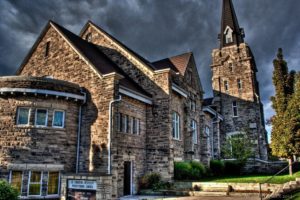 |
Please join us this Sunday, Palm Sunday as we begin Holy Week. The scripture readings for Sunday are:
The message is: Palming off the Palms If you have any questions or comments about the scripture readings or message please contact Rev. Scott McAndless at [email protected] All children, friends, grandchildren, neighbours are invited to join Joni Smith in the foyer at 9:45 am, just prior to the beginning of the service so that we can parade into the church together. The Thursday Night Supper & Social Gala dinner event is also on Sunday evening, 5:00 pm and there are still a few tickets left. The menu includes ham and turkey & all the fixings. This year the ticket price of $15.00/person includes dessert as well. |
One Perfect Afternoon
Hespeler, 7 April, 2019 © Scott McAndless – Lent 5
Isaiah 43:16-21, Psalm 126, Philippians 3:4b-14, John 12:1-8
| I |
remember one perfect afternoon when I was in grade 6. It was a winter’s day and after school a friend and I had stayed late. We were having fun in the schoolyard. The hills behind the school were covered in ice and snow and we were sliding down them. And we were having so much fun particularly because my winter boots at that point were kind of old. The tread was all worn away and so I was able just slide all the way down the hill on my feet. It was so much fun. It was a perfect afternoon and I never wanted it to end.
And then my mother came along. You see, she had been waiting for me at home and wondering why I was taking so long so she came to look for me. She had decided that today was the day I needed to get new boots. She had noticed something. She had noticed that my winter boots were really old. So old, in fact that the tread was, like, completely worn away. We had to go shopping for new boots and we had to go now.
So I went. And my mother has never said anything, but I suspect that what happened next was probably one of the most frustrating experiences has she ever had shopping with me because, well, none of the boots that we tried on were what I liked. I couldn’t, or at least I didn’t, explain what was wrong with every pair of boots that I tried on, but I’ll tell you right now what was wrong with them. They were all winter boots and, as winter boots, they all had treads on the bottom. And that was the last thing that I wanted because if I got boots with winter treads on them, I would never be able to go sliding down the hills behind the school standing on my feet again. I would never again have that perfect afternoon.
Well my mother was not going to leave that shoe store without a new pair of boots for me. So there was nothing for it but that I choose a pair and finally I found them. They were ugly. They had these weird high heels on them. They were actually really kind of heavy so that if you walked too far your feet would drag. But they had one thing going for them: they had virtually no tread. I don’t know what my mother thought about my taste in boots. I’m quite sure she didn’t know what I was basing my decision on. But at that point, I’m sure she just wanted to get out of the store. My winter boots had been chosen.
I’m sure you can guess the rest of the story. Spring came soon after. I graduated from that school and went to another school that was a much longer walk. I never again had the opportunity to slide down those hills on my feet. And I was stuck trudging along in those ugly, heavy boots for many years to come.
And I think I’ve gleaned a little bit of wisdom from that experience. It is probably not a very good idea to make a life decision based on wanting to go back to one perfect afternoon. And I’ve noticed that nobody ever talks about that side of success and perfection. When something goes extraordinarily well, it can sometimes doom us to future failure.
You know, the people of Israel once had a perfect afternoon. It was amazing. There they were, trying to escape from lives of slavery in Egypt when they were caught, red handed, between a hostile army of horses and chariot drivers and an uncrossable body of water. They were sure they were done for. They were getting their affairs in order. And then, a miracle happened. God made “a way in the sea, a path in the mighty waters.” It was a path that they could follow on foot but when the chariots tried to chase them their wheels stuck in the muck. “They lie down, they cannot rise, they are extinguished, quenched like a wick.”
It was perfect – they were saved, chosen and beloved by God and their enemies got everything that they deserved. And so they told the story of that perfect afternoon over and over again and who wouldn’t forgive them if the story grew a little bit in the telling over the years. But here is the thing. The story was so perfect that, generations later, they were still trying to make it happen again. They were still buying winter boots without treads just in case they might have the opportunity to go sliding down the hills on their feet. No, wait, that’s not quite right. Let’s say that they kept buying rubber boots just in case they had to go wading through the Red Sea again.
And you might think that that should be a good thing, that we should remember those moments in our history when God did something truly amazing for us. And of course that is true. But the fact of the matter is that that perfect afternoon was creating big problems for the people at one particular moment.
You see, the people were in a position once again where they needed God to save them. But they weren’t slaves in Egypt. They were exiles in Babylon. And you might say to that, fine, what’s the problem with that? Surely the God who could save them from Egypt could save them from Babylon too. You would think. But it seems that they were having problems. There wasn’t a Red Sea between Babylon and their homeland. What there was instead was a huge uncrossable desert. They were so stuck back in the time when God saved them by creating a path through the sea that they couldn’t imagine that God could save them by creating a path through an uncrossable desert. They had bought rubber boots and they were no good for walking in the desert. That is the only way that I can understand the message we read in the Book of Isaiah this morning.
“Do not remember the former things, or consider the things of old,” says the prophet. Now normally that is not something that we would expect to read in the Bible. Usually the people are being told to remember what God has done for the nation in the past. But, no, this prophet insists that they must forget it. Why? Because God says, “I am about to do a new thing; now it springs forth, do you not perceive it? I will make a way in the wilderness and rivers in the desert.” You see, that is their problem. They do not perceive it. And the reason why they do not perceive this new thing that God is doing is because they can’t forget that perfect afternoon that they had so long ago. They can’t stop trying to go back there.
I sometimes wonder if this isn’t the problem that we also have as the church these days. It’s not that God is unable to save the church, that is, to give to the church a future that is exciting and meaningful. God is doing that and it’s going to do that. Our problem is that we do not perceive it. The reason why we don’t perceive it? It’s probably because we remember one perfect afternoon. and the perfect afternoon that we remember doesn’t include sliding down snow-covered hills or jaywalking across the Red Sea. The perfect afternoon that we remember is that moment when everything seemed to be just right in the church. And I realize that that perfect afternoon occurred at different times for different people. For some people, the perfect afternoon of the church happened back in the 1960’s and 70’s when Sunday Schools were full to bursting with the children of the baby boom. I don’t know how many times I have had people paint the picture of that particular perfect afternoon for me. But other people may locate that perfect afternoon of the church at another point in time – especially at a moment when the ministry of the church may have fulfilled a particular need for them or touched a particular nerve.
The problem is not that we have such perfect afternoons in our memories of the church. Nor is the problem that we may sometimes remember them in some idealized way (forgetting some things about them that were less than perfect). The problem comes when we are so fixed on that perfect afternoon that we do things like try to revive programs that no longer work, or we reject new ideas or new ways of doing things because they do not look like that perfect afternoon or we criticize something that is happening that is really good because it doesn’t look like or measure up to something that happened during the perfect afternoon. When the memory of that perfect afternoon means that we cannot perceive the new things that God wants to do and is already doing among us, then we are certainly better to “not remember the former things, or consider the things of old.”
So, I do think that the wise words of the ancient prophet do apply very powerfully to our collective life as the church today. But there is also an individual application that the Apostle Paul would bring to our minds in the reading from his Letter to the Philippians today. Paul is speaking to the Christians in Philippi in this passage about his own struggles to be a faithful follower of Christ. He looks back on the perfect afternoon of his own life and says he was “circumcised on the eighth day, a member of the people of Israel, of the tribe of Benjamin, a Hebrew born of Hebrews; as to the law, a Pharisee; as to zeal, a persecutor of the church; as to righteousness under the law, blameless.”
Paul is here looking back at a very idealised time in his life. It was basically a time when everything made sense. He had answers to every question. He knew what was right and he knew what was wrong and he knew what he had to do in every circumstance. Yes, that sense of certainty that he had made him do things, like persecute the church, that now horrify him, but he cannot deny that it just felt right at the time. And Paul could have held onto that perfect afternoon, kept trying to go back there, but it would have meant missing out on this incredible new thing that God had done in Jesus Christ. It would have meant missing out on the wonders of God’s grace and the power of Christ’s resurrection.
But even after Paul had given in and become a follower of Christ, he could still have spent all of his energy trying to get back to that perfect afternoon. He could have become one of those Christians who was always trying to say he was better than everyone else and that he had it all right. Paul knew that that was the danger and so he made a conscious choice. He would forget what lay behind and strain forward to what lay ahead. He would press on toward the goal for the prize of the heavenly call of God in Christ Jesus.
My friends, we have all of us been blessed to have had perfect afternoons in our lives both individually and communally. We have those moments in time where everything just seemed to go so well. That can be a wonderful blessing but the warning of Paul and of the prophet is that it can also be a curse. I invite you – I invite all of us – to examine the things that we do in our Christian life. Ask yourself, are you buying boots in the hope of recreating a perfect afternoon that will never happen again? Think of some of the decisions you make, some of the things you buy. Are you doing things, trying to recreate a memory of a time that may be wonderful but just won’t happen again?
I don’t blame you for doing that. I’ve done it myself, as I have confessed. But I will remind you that the danger is not that you might end up wasting your mother’s money on boots that you don’t really like (if you know what I mean). The real danger is that you might not perceive the new thing that God is doing in our midst. And I’ve got to admit that that is my greatest fear, that I, that you and that we together as the church might miss out on the great new thing the God has probably already begun to do in the world today.
Keeping Up-to-Date
Sunday, April 7, 2019
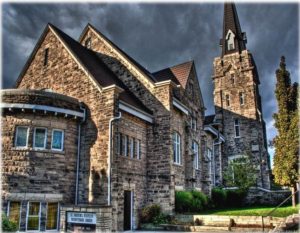 |
| The scripture readings for this week are:
The message this week is: One perfect afternoonIf you have any questions or comments about the scripture readings or the message please feel free to contact Rev. Scott McAndless at [email protected] Explorations in Music will be held in the Fellowship Room following worship for JK – Grade 6 children to participate in. Everyone is welcome to come in the see what goes on in these interesting and fun classes. |
